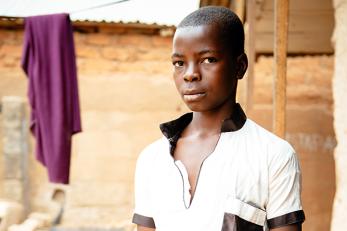Motivations and Empty Promises: Voices of Former Boko Haram Combatants and Nigerian Youth

Boko Haram, one of the world’s deadliest armed groups, is waging an insurgency in the name of creating an Islamic caliphate. This violent conflict in Nigeria’s Northeast has killed nearly 17,000 people since 2009, displaced nearly 2.2 million people, devastated thousands of communities, and slowed the economy.
Mercy Corps' April 2016 research investigates key motives for youth to join Boko Haram, so that government actors, donors and civil society can design responsive programming to reduce youth participation in the violence. Through this research, Mercy Corps spoke directly to the youth involved to learn why youth join or were vulnerable to forced recruitment into Boko Haram. We spoke with 47 former members of Boko Haram in Nigeria’s Borno, Yobe, and Gombe states, in addition to dozens of youth who did not join, family and friends of members, and community leaders. We found that in the midst of challenges, the local strategies to prevent violence and support youth exercised by so many communities can form a strong foundation for the future of youth and stability in Northeast Nigeria.
Key Findings
- There is no demographic profile of a Boko Haram member. Members we spoke to came from diverse backgrounds. Some had jobs, and others did not. Some had attended secular school, others had attended Islamic school, and others had dropped out.
- Influence from social and business peers is a key factor in recruitment. Almost all former members cited a friend, family member, or business colleague as a factor in their joining Boko Haram.
- Youth see in Boko Haram an opportunity to get ahead through business support. Many youth described either accepting loans prior to joining or joining with the hope of receiving loans or capital for their mostly small, informal businesses; loans fueled their economic ambitions in an atmosphere of high inequality.
- Broad frustrations with the government created initial community acceptance of Boko Haram. Boko Haram took advantage of deep grievances around government inadequacies and security abuses to gain a foothold in communities. About half of former members said their communities at some time generally supported the group, hoping it would bring a change in government.
- Local counter-narratives on the hypocrisy of Boko Haram are working. Youth who resisted joining shared a narrative of Boko Haram as a corrupt, greedy organization focused on enriching its leaders. These messages are being crafted by local religious and traditional leaders.
Additional Research
Mercy Corps’ September 2016 follow-up study, Gifts and Graft: How Boko Haram Uses Financial Services for Recruitment and Support, examines in greater depth how inequality drives recruitment, and particularly how Boko Haram uses financial incentives to lure people into the group. It also explores the broader landscape of financial opportunities and barriers to accessing them, with the aim of informing smart policies and programming that address youth needs and help to prevent future participation in violence.
"Motivations and Empty Promises" and "Gifts and Graft" by Mercy Corps is licensed under a Creative Commons Attribution 4.0 International License.
Based on a work at www.mercycorps.org.

